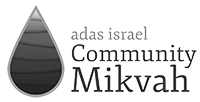What is the “open mikveh” movement?
The ritual of immersion in a mikveh is one of Judaism’s oldest practices. However, until recently, this powerful experience was effectively off-limits to a majority of Jews. The open mikveh movement is committed to making mikveh accessible to Jews of all denominations, ages, genders, sexual orientations, and abilities.
The Rising Tide Network was founded in 2017 to foster this vision of mikveh and open the doors to the mikveh for everybody in the Jewish world.
The mikva’ot (plural of mivkeh) affiliated with the Rising Tide Network take a welcoming and inclusive approach to ritual immersion and encourage the full diversity of the Jewish community to discover and embrace this spiritual practice unlike any other.
What is a mikveh?
A mikveh is a Jewish ritual bath, used to mark moments of personal transition, for example, from unmarried to married; from not-Jewish to Jewish; from “spiritually unready” to “spiritually prepared.”
Water plays a major role in the sacred narrative of the Jewish people. For example, the passage of the Hebrews through the waters of the Red Sea marked their transformation from a tribe of slaves to a free people.
Mikveh symbolically enacts changes in personal status for individuals. The most common and best-known purposes of ritual immersion include niddah, a time of physical separation between partners during a woman’s menstrual cycle, and conversion to Judaism, which is finalized by immersion in a mikveh.
Historically, Jews have elected to immerse at other times as well, such as in preparation for Shabbat and during the ninth month of pregnancy. Today, Jews immerse for a variety of reasons, such as: to celebrate milestone events like bar and bat mitzvah, graduation, or significant birthday and anniversaries; to signify a new start in the aftermath of pain and trauma; to mark the end of a period bereavement, to heal after miscarriage, chemotherapy, or assault.



